|
|
|
Sort Order |
|
|
|
Items / Page
|
|
|
|
|
|
|
| Srl | Item |
| 1 |
ID:
144481


|
|
|
|
|
| Summary/Abstract |
ASEAN will form on December 31, 2015, the ASEAN Community, which will try to integrate 10 very heterogeneous countries into “one family”. On one hand, historical developments and security concerns led to a rather nationalistic position of the individual countries, and on the other, developments related to “non-traditional security” (NTS) issues are forcing a rethinking of hard-line positions in favour of a regional maritime approach. Whilst in many political and academic circles the term “regional resilience” is regularly used, the understanding ranges from the interpretation that this is a new Chinese wording for justifying the increase of the military and maritime power of the country, via the claim that the “new” security approaches are just emerging after the end of the Cold War, to the differentiating theory debate about different political approaches to international relations and the NTS issues. This article explores the historical development of NTS threats and then addresses some risks for the ASEAN Community 2015 as well as providing answers to the ASEAN 2015 three-pillar strategy of the ASEAN Political–Security Community (APSC), the ASEAN Economic Community (AEC) and the ASEAN Socio-Cultural Community (ASCC). The article will explore a strategic approach rather than operational issues to address certain challenges within this strategy, and will discuss some maritime implications.
|
|
|
|
|
|
|
|
|
|
|
|
|
|
|
|
| 2 |
ID:
144482
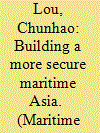

|
|
|
|
|
| Summary/Abstract |
In the past several years, maritime Asia has witnessed increasing security challenges, and this trend may persist in the near future. There are several underlying dynamics, including a geopolitical power game, lack of maritime governance and competition for maritime resources. However, in this globalised world, countries become quite interdependent and competition/confrontation is not the favourable policy choice. All countries share common interests in maintaining a stable maritime order, safeguarding the sea lines of communication (SLOCs) and developing a maritime economy. With China a rising maritime power, Chinese maritime policy has become important for Asia. Though incurring some misperception and misunderstanding, China will stick to its peaceful development strategy and try to foster a “harmonious ocean”, instead of resorting to the so-called “Neo-Mahanian Doctrine”. In achieving this, China will adopt an increasingly cooperative maritime policy, with the 21st-century Maritime Silk Road (MSR) initiative supplementing the effort.
|
|
|
|
|
|
|
|
|
|
|
|
|
|
|
|
| 3 |
ID:
144488


|
|
|
|
|
| Summary/Abstract |
Oceans link India across the continents in its benign quest for peace and tranquility. Compared to the vastness of the oceanic imponderables, the understanding of the oceanic environment appears to be in its infancy. There is a need to enhance information about the oceanic sciences across large distances and great depths, as this would enhance national security. This is well beyond the resource capacity of any one nation in the Indian Ocean Region. As a first step, the area of cooperation can include the setting up of sea observatories. This would require collaboration in sensor technologies for ocean environment, computation and processing ability, management of information, and enhanced communication systems over and under the seas. Such partnerships would create enhanced oceanic information zones, which would help strengthen the national security of a nation as well as regional maritime security.
|
|
|
|
|
|
|
|
|
|
|
|
|
|
|
|
| 4 |
ID:
144485
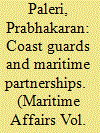

|
|
|
|
|
| Summary/Abstract |
Coast guards are unique forces with global potential. The first coast guard was created nearly four centuries ago in Europe, but countries are still unable to make the most of these forces even in the post-UNCLOS (United Nations Convention on the Law of the Sea) world. This paper underscores their strategic role and argues that the coast guards can accentuate their value in the geostrategic context by establishing maritime partnerships. Engaging the coast guards in maritime partnerships can also lead to combined and enhanced responsibility towards the global commons at sea.
|
|
|
|
|
|
|
|
|
|
|
|
|
|
|
|
| 5 |
ID:
144487
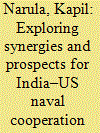

|
|
|
|
|
| Summary/Abstract |
India and the US are strengthening their strategic and military partnership under the 10-year defense framework agreement. This paper proposes that there exists a strong case to extend this cooperation into the realm of energy and environment, and explores the synergies and prospects between the navies of the two countries. The paper argues that navies have a prime role in contributing to energy security and environmental protection, and this function will gain increasing relevance in the forthcoming decades. A comparative assessment of energy use, and the energy and environment roadmaps, of the US navy and the Indian navy are presented to highlight the similar challenges and actions being undertaken to address the common concerns. The paper also proposes specific elements and the scope of naval cooperation in the relevant domains before concluding that such a programme will be mutually beneficial for the two navies.
|
|
|
|
|
|
|
|
|
|
|
|
|
|
|
|
| 6 |
ID:
144475
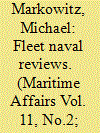

|
|
|
|
|
| Summary/Abstract |
Warships are symbols of national power and pride. Naval reviews are occasions where navies display their fleets in the presence of heads of state, dignitaries and foreign guests. Naval reviews have a long, well-documented history stretching back to the medieval era in Europe. The British Royal Navy has often conducted naval reviews, originally as part of mobilisation for war, later in observance of royal anniversaries and significant occasions. Many navies, influenced by British traditions, have adopted the custom. International naval reviews provide opportunities for officials and military mariners to meet their counterparts, learn about the capabilities of friends and potential adversaries, share experiences and develop relationships that will prove valuable both in times of conflict and in peace.
|
|
|
|
|
|
|
|
|
|
|
|
|
|
|
|
| 7 |
ID:
144479


|
|
|
|
|
| Summary/Abstract |
The relationship between India and the United States has transformed significantly since the Cold War, notwithstanding the denial regime imposed after the 1998 nuclear tests. In the complex 21st-century environment, both countries have articulated their strategic outreaches spanning the new geographical construct of a maritime configured Indo-Pacific. This article examines the coherence, correspondence and divergence in the approaches and the institutions of relevance in India's “Act East” and the US “Strategic Rebalance” through the “interest contiguity” paradigm. The salient aspects examined are the politico-diplomatic, economic and military security dimensions, by using a combinational of realist and rational choice theoretical prisms. The paper concludes that while there is a virtual coincidence of “interests’” between India and the US, their approaches and institutional frameworks are different in certain cases, driven by respective geopolitical, geoeconomic and geostrategic imperatives. The emerging positivity in the Indo–US relationship, like many other important engagements across the Indo-Pacific, will continue to contain a mix of cooperation and competition, which is not unusual and offers avenues for further strengthening of coordinated endeavours.
|
|
|
|
|
|
|
|
|
|
|
|
|
|
|
|
| 8 |
ID:
144489
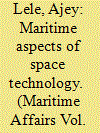

|
|
|
|
|
| Summary/Abstract |
For any nation-state, multiple agencies are drawn in to guard their maritime interests, and technology plays a crucial role towards guarding such interests. This paper debates the significance of space technologies for the maritime domain in general and navies in particular. It identifies specific space technologies of relevance for improving ship movement and weapons delivery performance. Lastly, the paper also takes a macro view about investments made by India in space technologies for the purposes of their maritime requirements.
|
|
|
|
|
|
|
|
|
|
|
|
|
|
|
|
| 9 |
ID:
144477
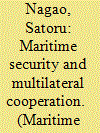

|
|
|
|
|
| Summary/Abstract |
This paper focuses on multilateral naval cooperation. To understand the importance of multilateral naval cooperation, it is necessary to answer three questions: what kind of problems are we facing; what kind of cooperation mechanisms are effective to deal with these problems; and which one of them is the most important? Naval cooperation amongst friendly countries needs to primarily deal with imminent threats such as the arms race and power game in this region, non-state threats and concerns about the future. To effectively deal with these threats, countries have engaged in confidence-building mechanisms by sharing information regarding various events, and by building capacity to deal with emerging threats and uneasy situations. All of these methods elaborate the importance of multilateral cooperation, and the navies of countries should cooperate actively in this network to maximise outcomes. Hence, there is great potential in the multilateral framework of the “New Alliance” which is developing in the region.
|
|
|
|
|
|
|
|
|
|
|
|
|
|
|
|
| 10 |
ID:
144478
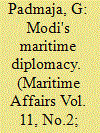

|
|
|
|
|
| Summary/Abstract |
This paper examines the maritime diplomacy of India's Prime Minister Modi, and argues that it is encapsulated in the acronym SAGAR, i.e. security and growth for all in the region. This vision also spells out that maritime security is the primary responsibility of the littoral states, while stressing cooperation and collaboration. It also highlights aspects of the Blue Economy and suggests that SAGAR is nonassertive, seeks peaceful resolution of disputes and calls for a commitment by all countries to adhere to international maritime laws. The paper argues that India conducts its maritime diplomacy at three levels which give it a “strategic strength”. They are: high-level bilateral visits where strategic issues are an important component; regional collaborative means; and, lastly, revitalizing the cultural and civilisational links with projects such as “Project Mausam”. The paper concludes that the International Fleet Review to be held at Vishakhapatnam in 2016 gives India a “strategic opportunity” to contribute to a maritime narrative which may be able to address the mistrust in the current global maritime order.
|
|
|
|
|
|
|
|
|
|
|
|
|
|
|
|
| 11 |
ID:
144476


|
|
|
|
|
| Summary/Abstract |
With its extremely long coastline, four strong fleets and abundant maritime resources, Russia cannot be viewed as just a continental power. A combination of rich naval traditions, enormous economic potential, technological expertise and independent foreign policy puts Russia in a category of global sea powers. That is exactly how it looked for most of the 20th century. Suffice to say that by the end of the Cold War era, Soviet warships and nuclear submarines posed a serious challenge to the US Navy. In the 1990s came a drastic decline in the naval capabilities of the country, but it did not last long – at any rate, not in historical terms. The early 21st century has been marked by an effort to rebuild the Russian Navy and increase its activities. Whilst trying to modernise its naval potential, Russia does not aim to change the status quo and expand its sphere of influence at the expense of others. Its primary purpose is to discourage other powers from dragging it into conflicts which, in the case of Russia's involvement and given its size and military might, could aggravate the international geopolitical order. This course is generally conducive to a greater polycentrism in global naval affairs, and a more stable world.
|
|
|
|
|
|
|
|
|
|
|
|
|
|
|
|
| 12 |
ID:
144484


|
|
|
|
|
| Summary/Abstract |
The Indian Ocean Rim is a vast geographical entity and consists of a number of regional and subregional identities. The paper highlights the common maritime concerns of littoral nations and the need for greater engagement and collaboration to address common threats and challenges. It then traces prominent maritime cooperation initiatives in the Indian Ocean Region (IOR), highlighting cooperative trends at regional, subregional and bilateral levels. Ranging from security cooperation among nations and regional cooperation for fisheries management, to multidimensional capacity building, the trends also bring forth the opportunities for furthering the cooperation. The paper explores avenues for cooperation under existing pan-IOR constructs, underscoring the need for a multi-pronged approach to capacity building, and harnessing the potential of such cooperation across various maritime disciplines.
|
|
|
|
|
|
|
|
|
|
|
|
|
|
|
|
| 13 |
ID:
144486


|
|
|
|
|
| Summary/Abstract |
The paper focuses on the importance of foreign military training. While recognising the significance of professional outcomes of such programmes, the paper highlights the importance of relationship building and acquiring a deeper understanding of the nuances of each other's culture. It argues that this requirement is all the more relevant today when the nature of warfare has changed and collective solutions are more often than not the preferred response mechanism.
|
|
|
|
|
|
|
|
|
|
|
|
|
|
|
|
|
|
|
|
|